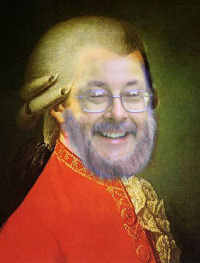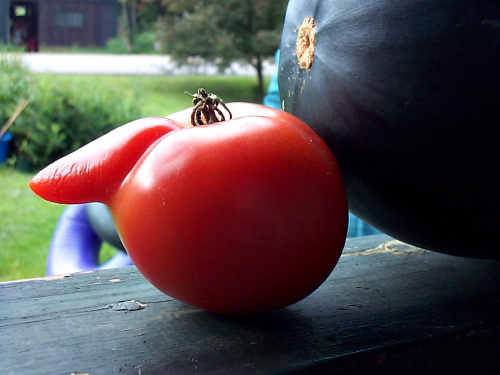A 365-Day Project
"We Are All Mozart"
A project to create
new works and change
the perception of the
music of our time.


 August 29, 2006
August 29, 2006 
First item: My interview on WKCR New York (89.9 FM) with Anne Cammon is available. The show is "Arts & Answers" with special guest Robert Voisey (who also did the wonderful intro/outro music), and broadcast August 12. I sounded more like used-car salesman Milton Babbitt than I expected, but it was exciting and even revealing at times. You can hear it as a broadband stream or via download. Appearing on Anne's show was a great pleasure.
* * *
There's a guy who is always wrong. No, not the guy in the commercial who talks about his job's "French benefits." A writer who, for reasons unknown, is influential -- and, yes, always wrong. Such as when he wrote, "musical value is destroyed by market force" and "composers have better things to do" than be involved in cultural organization and "classical recording was a 20th-century industry, like typewriters and coal-mining". That always-wrong guy is Norman Lebrecht -- and Norm, typewriters and coal mining are 19th century.
Lebrecht and his ilk are the curmudgeons of the classical world, but my point is not to berate Lebrecht, deserve it though he does. He is merely a symptom of the exquisite and maddened confusion of the nonpop establishment. On the on hand, it slinks in with tepid enthusiasm to contemporary marketing (only to be bludgeoned by Lebrechtian critics) and other the other hand, its fear of losing the last of its live audiences is so great that it has frozen the repertoire into about fifty pieces. New music has become as much about human interest (in subject matter and concert programming) as about the abstract artistic act of sonic creation.
Yesterday the discussion explored the condiment-world that new music has become -- not among the new nonpop groups, which make up a different ensemble genre, the heavy metal of nonpop -- and today it's time for some solutions.
Let Them Go
The classical audience is untrainable. For the entire lives of every single audience member, the concept of greatness arising solely out of the past has been systemically taught. The marketers and entrepreneurs continue this behavior with a new generation of performers where glamour and guile precedes music, and the backgrounded music remains old. It's cheap and easy. There's no effort to producing it. So the immersion in old music continues -- and not just any old music, but cheaper old music. Not a lot of Mahler or Brucker gets tossed out there, but buckets of Bach and Mozart with their economical orchestrations. Audiences are trained out of the music that expects their psychological participation. This cannot be reversed. No amount of programming adjustment will alter the conclusion of old music = great, therefore new music = not great. The only solution is to let that audience go, whatever the financial calamity that results.
Were this the decision of a just a few people, it might be possible to create something of a hermetically sealed state, where only new nonpop is heard. The following is excepted from an article upcoming in Greywolf Artistry.
|
For ten years, I created my own "hermetically sealed state." Being a composer, doing a radio show, and attending concerts of music by colleagues have all conspired to have me listen to thousands of hours of new nonpop -- and almost exclusively new nonpop -- as time constraints have squeezed out the older pieces. Rather than wear me out or trouble me, it's instead given me a hunger for more, increased my critical skills, expanded the scope of my listening facility, opened my mind to new ideas, and warmed my heart with the power and beauty that composers bring to bear upon their work (keep in mind, of course, that I cried when I first heard Stockhausen's Gesang der Jünglinge as a teenager). And at the same time, it dramatically lowered my tolerance for older classical nonpop to the point that for the most part I listen to it with impatience (even the music of my own earlier days!), chafing at its reek of the past -- a past that I would not want to live in. Walking into Jack Finney's The Third Level holds no enticement for me. I like the modern world. I hunger for the future and, to my wife's continued chagrin, still look longingly at the sky in hopes that one day I might be able to travel out of the atmosphere, even just for a few moments. (Just to set aside an objection, let me say that I don't believe in some value-laden concept of musical progress, but merely the inherent wonder of musical change.) Some might insist they would never close themselves off to art or music or literature based strictly upon its age, but rather would base programming choices on 'aesthetic, cost-responsible and practical' characteristics. These guidelines are all legitimate, and with them I have no surface argument. But let's say my proposed international fascisto-musical state was founded in 1980 and required that all music be composed within the time of its existence; as of this writing, that's a little over 25 years. Accept that as your reality for a moment, and consider what kind of situation you'd find yourself in, and how you'd deal with it imaginatively and in ways that would satisfy you and your audience. I'll address this to the "you" -- a composer, conductor, performer or promoter who is aware of the style, length, quality and difficulty level of the myriad pieces being written for orchestra today. Not even including the diversity of the few living famous within our niche (Torke, Tower, Glass, Dun, Del Tredici, Higdon, Adams-the-both, Reich...), you'd have a choice that would be enormously variegated and, for purposes of even a part-time semi-professional orchestra's programming, virtually unlimited. What would be lost in the sort of programming? You and your musicians would naturally be familiar with the musical history as students of the artform. Scores and recordings would be available from the historical library, and you'd have sufficient musical imagination that the interposition of a playback format would be merely an ephemeral challenge. You'd work directly with composers. You'd encourage your own musicians and audiences to create new work, and they'd participate with the enthusiasm of any community that hangs its own art, reads its own poetry, sings its own songs, acts its own plays, sews its own clothes, or cooks its own meals. Indeed, nothing would be lost but the occasional old chestnut -- and you could beg the authorities to permit you the occasional old piece! That would be your challenge instead! Surely this is some sort of odd & twisted mirror image of recent orchestral history. But were I an active conductor/programmer in today's real world, for each concert I would imagine myself living in that imaginary totalitarian state, having to work creatively under the oppressive "yoke of the present," and with no choice but to do it or be sent to the gulag. And suddenly those pieces that once seemed of marginal interest would become the centerpieces of my presentation, the core of my daily work. Music that before opened a program or closed the first half, or perhaps fanfared in the second half, would be the closing masterpiece. It would be surrounded by more pieces in many diverse styles -- yet all plucked from the present and near-present. The practical problem (other than budgets, as the pieces could be chosen to match the ensembles technical abilities) would be finding the larger works, those which could span half a concert -- if we could truly write for the symphony. Because of the effective ban on longer symphonic work for several generations (the "American Commissions": 10 minutes, low-cost, audience-friendly), the number of such compositions written commonly as Haydn might have done is reduced. Few composers even write the Beethoven/Dvorák/Mahler nine anymore (yes, there is Hovhaness), much less multi-movement symphonies. So you'd have that problem of continuity and judgment, investing in music without a nest of critical understanding. If everyone were doing this, however, that critical word-of-mouth professionally evaluated support structure would inform you. The market would be there, too. The second question is, why should you do this? And the answer is easier, even simple: Because you must. I have sat across the microphone from 250 composers and played their music for our audiences. You can imagine that it is clearly impossible for the work of 250 composers to be coincident with one other composer's taste. Yet I will advocate for (and seek commissions and performances for) almost every one of them at some musical level. I say 'almost' because we had some guests whose music is weakly conceived or poorly wrought (by measure of craft alone), and the marketing work must be their own. Among the rest, however, is a panoply of musical style from noise/quasipop artists (Pritsker, Schrock) through tough electroacousticians (Szymanski, Duckworth-the-younger) through orchestral professionals (Hagen, Del Tredici) through romantics (Deussen, Torke) and political composers (Ho, Weinbaum), soundscape artists (Radigue, Borghi), avant-gardists (Appleton, Hutchinson), post-classicists (Garland, Reynolds), to international groundbreakers (Saariaho, Behrman), and on and on. As I write each name, I remember their music, and however I find it appealing or not to my taste, it still enriches my experience and challenges my intellect. Music also grows, sometimes quickly, sometimes over the years. It is style, taste, technique and the ephemeral judgment. Here is a story: In the early 1990s, I heard in concert a piece for two high clarinets. I couldn't remember the name of the piece, but it enraged me. I paced around and mumbled about it, endlessly annoying my wife. The next day I woke up and thought, "It was brilliant!" I had hated it because I had not opened up to its own world. Placed as it was on the concert among lusher pieces, it seemed alien to head, heart and taste. But I grew. It forced me to grow. Overnight. And then I set out to find the composer, and finally, 13 years later she too sat across the microphone in her Amsterdam flat: the toweringly intense Margriet Hoenderdos. I have an abiding trust in composers. Do I like their all their work? Certainly not. But I take seriously the work of presenting what they do in their own sounds and in their own words. And I have an abiding trust in the listening public. Presented with conviction, composers and their works will be accepted, respected, adopted, and ultimately loved. |
We'll work out the economics of this mirror to our reverse systemic musical fascism in another episode. In the meantime, read a bit of Norman Lebrecht. Keep a clock running, and check the time between start and onset of illness...

From our garden exactly four years ago this week: a tomato for Norman Lebrecht